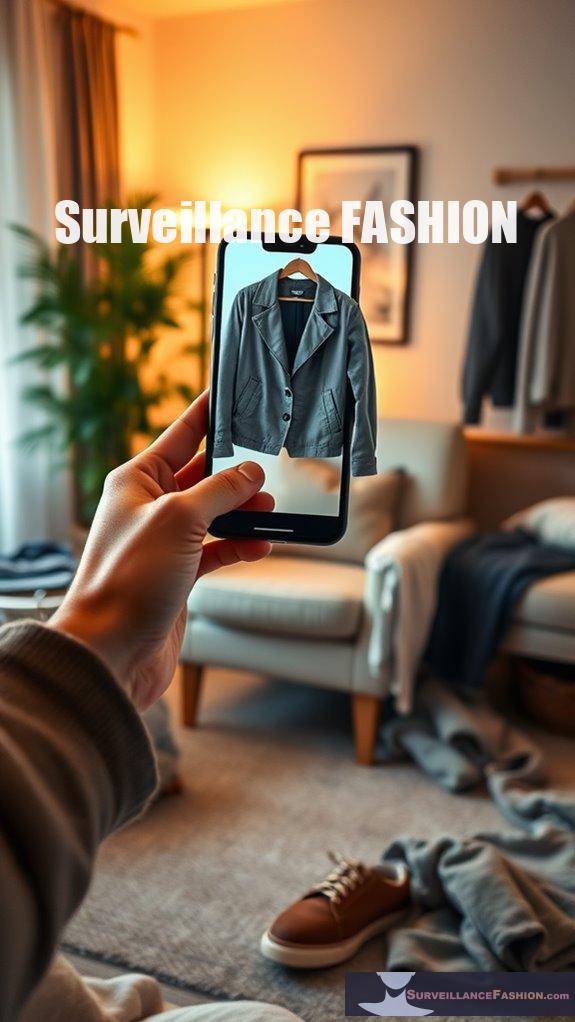Digital tracking shapes your every purchase decision by collecting detailed data on your online behaviors, preferences, and interactions, enabling businesses to create personalized marketing strategies. This tailored approach often manifests through targeted advertisements, which can enhance your likelihood of purchase considerably. For instance, products accompanied by positive reviews can see a remarkable increase in consumer interest. As you engage further with this topic, you'll discover how these practices intersect with privacy concerns and developing fashion trends that advocate for data protection.
Quick Takeaways
- Digital tracking collects data on consumer behaviors, enabling businesses to tailor marketing strategies to individual preferences.
- Personalized advertisements based on tracking data enhance customer experiences and increase the likelihood of purchases.
- Online reviews, influenced by social media interactions, shape consumer perceptions and decision-making processes.
- Augmented reality tools engage consumers by allowing them to visualize products, improving confidence in purchase decisions.
- Privacy concerns surrounding digital tracking can deter consumers, highlighting the need for ethical data management practices.
The Mechanics of Digital Tracking in Consumer Behavior
As digital technology becomes increasingly intertwined with consumer behavior, understanding the mechanics of digital tracking emerges as essential for both businesses and consumers alike.
Digital tracking involves collecting data on your online activities through methods such as cookies and device IDs, which monitor your website visits and interactions across devices. This data informs businesses about your preferences, allowing them to tailor marketing campaigns that resonate with your habits. Consumer tracking enables brands to optimize products and services based on consumer data, enhancing overall satisfaction and loyalty.
Digital tracking gathers insights on your online behavior, enabling businesses to customize marketing efforts that align with your preferences.
For instance, when you browse a product, analytics software captures your engagement patterns, leading to more relevant advertisements. This synergy between consumer behavior and digital tools not only enhances your shopping experience but also empowers businesses to stay competitive.
At Surveillance Fashion, we aim to demystify these processes, shedding light on how they influence your purchasing decisions while advocating for greater transparency and understanding.
Personalization: The Double-Edged Sword of Targeted Marketing

While many consumers appreciate the tailored experiences that personalization offers, the complicated balance between customer satisfaction and privacy concerns makes it a double-edged sword in targeted marketing.
On one hand, personalization enhances customer experiences by aligning marketing strategies with individual preferences, thereby fostering loyalty and increasing conversion rates. Companies leveraging AI and machine learning can generate remarkable revenue growth—up to 40%—by crafting targeted messages that resonate with specific segments.
Conversely, over-personalization can lead to perceptions of intrusiveness and data privacy concerns, eroding trust. The challenge lies in steering through this elaborate environment, ensuring that while brands invest in building long-term relationships, they also respect consumer autonomy. Additionally, understanding the ethics of data collection is crucial in maintaining this balance.
This delicate equilibrium is essential, which is why we created Surveillance Fashion, to shed light on these issues.
The Power of Online Reviews and Social Media

Understanding the profound impact of online reviews and social media on purchasing decisions is essential, particularly in today's digital environment, where consumer opinions shape brand perceptions.
You mightn't realize that a staggering 93% of consumers acknowledge the influence of online reviews on their choices. Products boasting five reviews can see a remarkable 270% increase in purchase likelihood. Additionally, authentic feedback from verified buyers can enhance credibility, boosting purchase odds by 15%.
Social media, too, plays a crucial part; 87% of customers trust peer reviews over celebrity endorsements. Engaging with customers on these platforms, and responding promptly to reviews, fosters a sense of community and trust.
This is a core value of our website, Surveillance Fashion, which emphasizes transparency in consumer interactions.
The Role of Augmented Reality in Shaping Purchase Decisions

Augmented reality (AR) has emerged as a transformative tool in the realm of consumer purchasing, fundamentally altering how individuals interact with products before making a decision. By enabling immersive experiences, AR enhances customer engagement, allowing you to visualize products in real-world scenarios and reducing the risk associated with online purchases.
Interactive elements foster a hands-on understanding, thereby improving brand perception and decision confidence. For instance, virtual try-ons let you assess fit and style before making a purchase.
Interactive features enhance understanding and confidence, allowing you to virtually try on products for the perfect fit and style.
Moreover, AR's ability to provide detailed perspectives aids in informed decision-making, ultimately increasing conversion rates. As you explore new products, AR diminishes anxiety, facilitating adoption across various categories.
This innovative approach mirrors our vision at Surveillance Fashion, where we seek to elevate consumer experiences through cutting-edge technology.
Privacy Concerns and the Future of Data Control

As digital tracking technologies proliferate, privacy concerns have surged, compelling consumers to question the implications of their data being collected, analyzed, and shared.
You may find yourself unaware that apps track your location or share sensitive information with third parties, often without explicit consent. This lack of transparency means you might unknowingly consent to extensive data collection, hindering your control over your digital footprint.
Regulatory frameworks like GDPR emphasize clear consent, yet many businesses struggle to comply, risking significant fines. The ethical implications of mass surveillance practices are increasingly scrutinized, highlighting the need for a balance between security and individual rights.
As consumers demand more control, the future of data management hinges on transparency, robust security measures, and effective privacy-enhancing technologies.
At Surveillance Fashion, we advocate for greater awareness, empowering individuals to reclaim their autonomy in a digitally tracked world.
Navigating the Ethical Implications of Digital Tracking
Digital tracking technologies, while providing businesses with valuable understanding and enhanced marketing capabilities, introduce a complex web of ethical implications that warrant careful consideration. You must recognize the importance of transparency in data use; consumers deserve to know how their information is collected and utilized. Obtaining explicit user consent becomes vital, ensuring individuals have agency over their data. Furthermore, securing this data from unauthorized access is paramount, as breaches can erode trust. Companies must be held accountable for their data practices, avoiding manipulation or misuse. Adhering to changing regulations like GDPR is essential, as these frameworks offer guidance for ethical tracking. Additionally, the impact of data collection can extend beyond individual choices, influencing social bonds and community dynamics. At Surveillance Fashion, we advocate for awareness of these issues, fostering a culture where informed decisions empower consumers in the digital environment.
How Does Anti-surveillance Fashion Work?

While many may perceive fashion purely as a medium for self-expression, anti-surveillance fashion emerges as a critical response to the escalating concerns surrounding personal privacy in an age dominated by pervasive monitoring technologies.
This innovative approach employs various strategies, such as utilizing infrared LEDs to blind night-vision cameras, effectively disrupting surveillance recordings. Moreover, specific patterns on garments create algorithmic confusion, misleading facial recognition systems by generating false positives or negatives.
Artists engaged in projects like CV Dazzle utilize hair and makeup to obscure facial contours, enhancing anonymity.
High-end brands, like Cap_able, cater to an increasing market demand for privacy-protecting clothing, reflecting broader public awareness regarding surveillance risks. Such garments not only protect but also challenge pervasive privacy violations, emphasizing the importance of personal freedom. Additionally, the rise of anti-facial recognition clothing highlights a growing intersection between fashion and technology in the fight for privacy.
Eco-friendly Fashion Against Surveillance

The intersection of eco-friendly fashion and surveillance resistance presents a complex tapestry woven with sustainability and privacy concerns. As you explore this domain, consider how eco-conscious choices can liberate you from both environmental degradation and invasive tracking. Additionally, with the rise of anti-data collection clothing, consumers can now find stylish options that also prioritize their privacy.
| Eco-Friendly Materials | Circular Economy |
|---|---|
| Ethical wool | Textile recycling |
| Plant-based leathers | Resale and repair models |
| Bio-based materials | Second-hand markets |
| Natural fiber textiles | Closed-loop systems |
References
- https://www.nosto.com/blog/how-does-social-media-influence-customer-behavior/
- https://www.mdpi.com/2076-3417/13/18/10491
- https://www.frontiersin.org/journals/psychology/articles/10.3389/fpsyg.2022.865702/full
- https://emotrab.ufba.br/wp-content/uploads/2020/09/Saldana-2013-TheCodingManualforQualitativeResearchers.pdf
- https://www.marketmymarket.com/digital-tracking-and-why-its-the-first-step-to-success/
- https://www.resonio.com/market-research/consumer-tracking/
- https://www.verfacto.com/blog/data-driven-marketing/tracking-consumer-behavior-online/
- https://insight.kellogg.northwestern.edu/article/consumer-data-protection
- https://www.greenbook.org/insights/insights/enhancing-consumer-insights-with-digital-tracking
- https://useinsider.com/personalized-marketing/

Leave a Reply